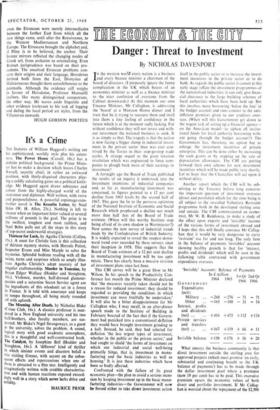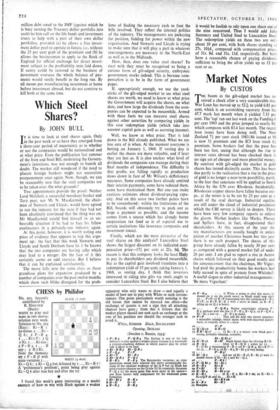Danger : Threat to Investment
THE ECOVONY A 'THE 6011
By NICHOLAS DAVENPORT
lN the western world every nation is a business and every finance minister a chairman of the board of directors. (I purposely ignore the funny complication in the UK which boasts of an economics minister as well as a finance minister to the utter confusion of everyone from the Cabinet downwards.) At this moment our own Finance Minister, Mr Callaghan, is addressing the 'board' at a Mansion House dinner and I trust that he is trying to reassure them and instil into them a tiny feeling of confidence in the future which is at the moment sadly lacking. For without confidence they will not invest and with- out investment the national business is sunk. It is as simple as that. The tragedy is that the nation is now facing a bigger slump in industrial invest- ment in the private sector than was ever con- trived by the Tories in their stop-go-stop trade cycles. A strange sequel to the great taxation revolution which was engineered to force com- panies to plough back more of their earnings to investment!
A fortnight ago the Board of Trade published the results of an inquiry it undertook into the investment intentions of industrial companies and, as far as manufacturing investment was concerned, its figures pointed to a 12 per cent decline from 1965 levels by the second half of 1967. This gave the lie to the perverse optimism of the National Institute of Economic and Social Research which prophesied a decline not much more than half that of the Board of Trade estimate. (When will this worthy Institute stop being afraid of its own shadow in Westminster?) Now comes the new survey of industrial trends made by the Confederation of British Industry. It is widely expected to reveal the steepest down- ward trend ever recorded by these surveys since their inception in 1958. This suggests that the Board of Trade estimate of a 12 per cent decline in manufacturing investment will be too opti- mistic. There has clearly been a massive revision of investment plans since last June.
This CBI survey will be a great blow to Mr Wilson. In his speech to the Productivity Con- ference last month the Prime Minister declared that 'the measures recently taken should not be a reason for reduced investment; they should be regarded as providing the conditions in which investment can most fruitfully be undertaken' It will also be a bitter disappointment for Mr Callaghan who, I may recall, in an after-dinner speech made to the Institute of Building in February boasted of the fact that if the Govern- ment had panicked into a conventional deflation they would have brought investment grinding to a halt. Instead, he said, they had selected for deflation 'the less urgent types of investment, whether in the public or the private sector,' and had sought to shield 'the forms of investment on which our industrial and social well-being primarily hinge, that is, investment in manu- facturing and the basic industries as well as housing.' It is just these industries which have been so badly affected.
Confronted with the failure of its great economic plan—the plan to avoid a serious reces- sion by keeping investment up in the basic manu- facturing industries—the Government will now be forced either to take direct investment action itself in the public sector or to increase the invest- ment incentives in the private sector or to do both. As regards the public sector it cannot at this early stage reflate the investment programmes of the nationalised industries; it can only give finan- cial clearance to the large building schemes of local authorities which have been held up. But this involves more borrowing 'below the line' in the budget account and runs counter to the anti- inflation promises given to our creditors over- seas. (When will this Government get down to the urgent task of setting up a financial agency— on the American model—to siphon off institu- tional funds for local authority borrowing with- out going through the budget account?) The Government has, therefore, no option but to enlarge the investment incentives of private enterprise. This can be done either by increasing the cash grants or by stepping up the rate of depreciation allowances. The CBI are putting forward their own scheme for new investment incentives which will be made public very shortly. Let us hope that the Chancellor will act upon it without delay.
Another report which the CBI will be sub- mitting to the Treasury before long concerns the important question of investment overseas (direct and portfolio) which for the time being is all subject to the so-called Voluntary Restraint programme both in the developed sterling area and outside. The CBI commissioned an econo- mist, Mr W. B. Reddaway, to make a study of the effect upon exports and 'invisible' income of the various forms of investment abroad and I hope that this will finally convince Mr Callag- han that it would be very dangerous to carry 'restraint' too far and too long. The only item in the balance of payments 'invisibles' account showing healthy growth is that for 'interest, profits and dividends' which will be seen in the following table contrasted with government expenditure overseas.
'Invisible' Account: Balance of Payments
In f million 1st Qr 2nd Qr Government 1964 1965 1966 1966 Expenditures (net):
Military .. —268 —276 — 71 — 71 Other —165 —180 — 51 — 54 Interest, profits and dividends (net) .. .. +416 +473
+ 112 +134 Private services
and transfers (net) .. + 167 + 159 + 66 + 11 Invisible balance + 150 + 176 + 56 + 20
What annoys the business community is that direct investment outside the sterling area for approved projects (which must promise 'an early, substantial and continuing benefit to the UK balance of payments') has to be made through the dollar investment pool where a premium (now 19 per cent) has to be paid. This excessive premium upsets the economic values of both direct and portfolio investment. If Mr Callag- han is worried about the repayment of the $2,500 million debt owed to the IMF (against which he is busy turning the Treasury dollar portfolio into cash) let him call on the life funds and investment trusts to help with a part of their own dollar portfolios, provided (a) he allows a free invest- ment dollar pool to operate in future, i.e., without the 25 per cent grab of the premium and (b) he allows the businessman to apply to the Bank of England for official exchange for direct invest- ment subject to the profitability tests laid down. If sanity could be restored to the business of investment overseas the whole balance of pay- ments would surely benefit in the long run. By all means put manufacturing investment at home before investment abroad, but do not contrive to kill both at the same time.



































 Previous page
Previous page